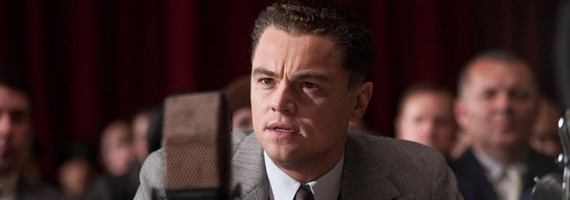Lindsay: Go read a book, an encyclopedia or hell, scan the Wikipedia page of J. Edgar Hoover instead of watching Clint Eastwood’s new film J. Edgar. I would love for that to sound less harsh but I speak the truth. The film struggles with melding some of its very positive attributes to an authentically engaging story. Sure you got acclaimed director Clint Eastwood directing a top notch cast including Leo DiCaprio, Judy Dench and Naomi Watts, a promising storyline surrounding a real life figure with a mysterious and complicated life and even the screenwriter of 2008’s hit Milk is on board ready to assist with gay subtleties. All that sounds great doesn’t it? It sure does, and that’s why no one will want to tell you the truth about J. Edgar. It’s a long, boring, and ill constructed tale, adding no intrigue beyond what most of us already know.
The movie follows the life of John Edgar Hover, from the time he was young to becoming the first Director of the Federal Bureau of Investigation and then to his death. The plot reveals an uncomfortably close relationship with his mother and his inability to effectively communicate with others. He is awkward with women and his idea of romance is showing off a card catalogue system he invented. It is revealed at one point that he had to overcome speech issues in order to address others. I was very interested to see how this movie would tackle the speculation surrounding Hoover’s sexuality and was disappointed to see the result. The film answers affirmatively regarding Hoover’s homosexual nature and details him as an understandably repressed individual. While I find this speculation is grounded I was bothered by the treatment of the issue in connection to the historical facts. The film barely touches on female romantic relationships J Edgar Hoover was said to be involved in, glossing over the fact in one scene and never talking about it again. I would have liked the story to focus on those possible relationships and how his secret sexuality (if it stuck to the theory) conflicted with it.
The characters introduced in the narrative of J. Edgar were also problematic for me. Two seemingly essential characters to the story, Clyde Tolson – Edgar’s right hand/unspoken object of affection and Helen Gandy (Watts) – personal secretary, are never fully developed or given proper back story. Both characters stick by Hoover consistently in the film but are never given reason. For example with Gandy, she is played well by Watts, who is nuanced in her portrayal, but all we know about her determination is one line where she states she is not interested in marrying and that her job comes first. Even Edgar himself, again played outstandingly by Struttin Leo, can be boiled down to unexciting traits exhibited through not-so-subtle tells. It certainly gets old fast watching a film with such exemplary talent scramble it’s way through murky storytelling.
Sadly, the fine performances of the film are never enough to escape the technical pitfalls. Some of the old age makeup effects are impressive but often times they just can’t quite pass as authentic. Also, from what I can only assume is an effort to shade some of the makeup details, the film appears overly dark in contrast ratio. Add in some tacky score pieces and unrealistic dialogue, and the movie just feels cheap. It even boarders on bad melodrama at some points. J. Edgaris a staggeringly unimpressive piece of work that a few very gifted actors signed onto. Perhaps their presence is enough to get you watching but I feel like this story would be served much better as a biographical book.





